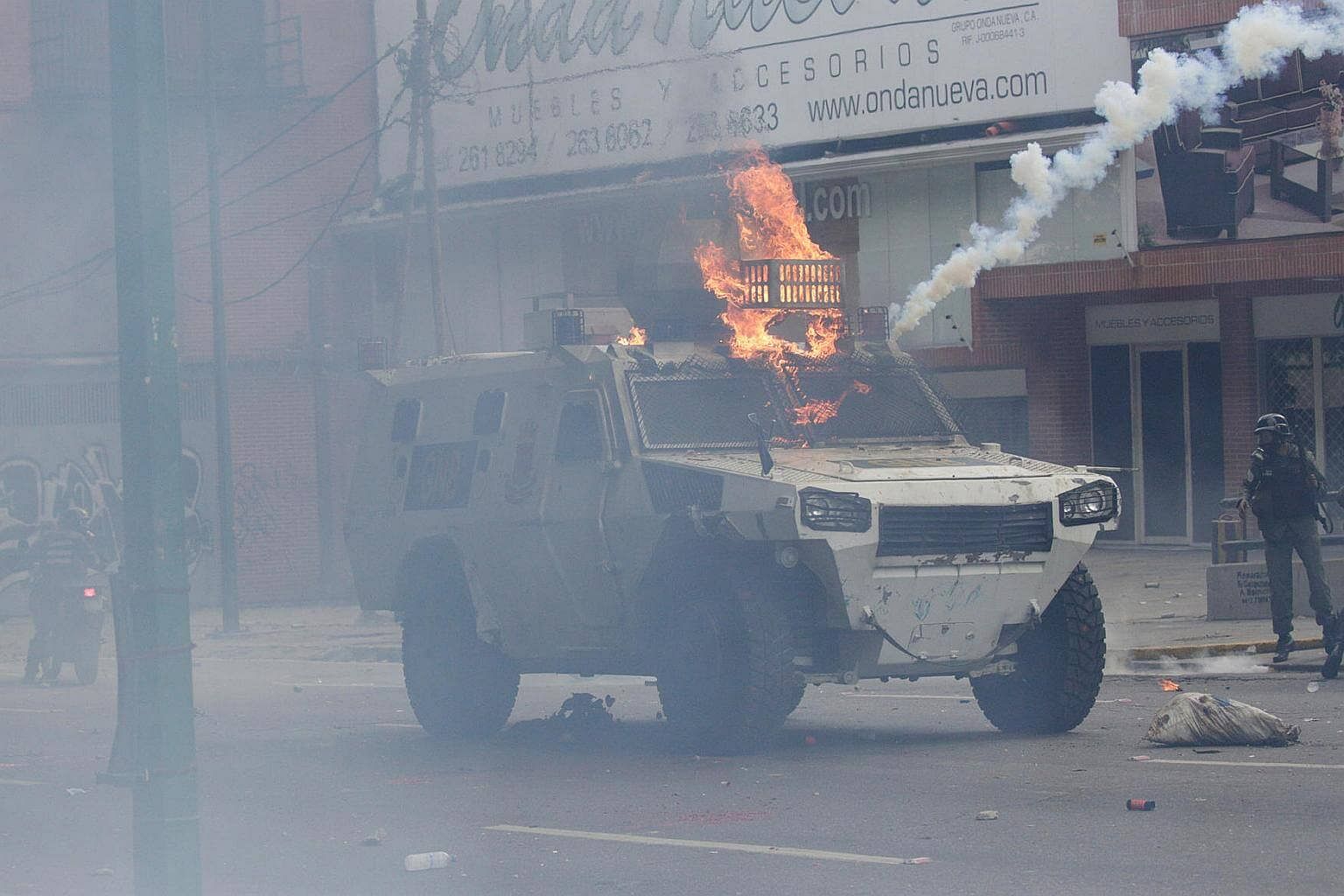CARACAS (AFP) - University students in Venezuela will lead a fresh round of marches against President Nicolas Maduro on Thursday (May 4), a day after police fired tear gas and protesters hurled Molotov cocktails in rallies against his plan to rewrite the constitution.
Violence erupted in the latest of more than a month of clashes that prosecutors say have now killed 32 people in the oil-rich nation stricken by shortages of food, medicine and other basics.
Government forces used tear gas and water cannon against demonstrators marching along a highway in east Caracas, the prosecutor's office said. Protesters fought back with rocks and Molotov cocktails.
More than 300 people were injured in Wednesday's unrest, officials said.

The latest fatality was that of an 18-year-old male struck by a projectile.
Looting broke out for a second straight night in the northern city of Valencia.

Daniel Ascanio, a student leader from Simon Bolivar University, told reporters that students will march from campuses on Thursday around the country to demand "democracy and freedom."
"We will be joined by unions, homemakers, and lawmakers. All sectors of society will mobilise to send a message to Maduro," said Ascanio.
Clashes broke out on Wednesday after riot police blocked demonstrators from advancing towards state institutions in central Caracas, where Mr Maduro addressed a rally of thousands of his supporters.
The opposition accuses the elected president of maneuvering to strengthen his grip on power. He has for months been resisting calls for a vote on removing him from office as the country staggers under food shortages, a near-crippled state-run economy and one of the world's highest inflation rates.
Clouds of grey smoke from tear gas canisters filled the air as police with riot shields and trucks advanced along a major avenue in the east of the capital.
Protesters hurled stones and set fire to barricades. Officers fired tear gas, rubber bullets and water cannon to push them back.

Protesters were enraged by the socialist president's launching of procedures by the electoral council to draw up a new constitution.
"I am convening a national constituent assembly of citizens with deep popular involvement so that our people... with their voice can decide the destiny of our homeland," he said in a speech at the council.

Private polls indicate that more than 70 per cent of those interviewed do not support Mr Maduro, who was elected in 2013 to succeed his late mentor Hugo Chavez.
Mr Maduro said the constitutional reform body would not include political parties with seats in the opposition-controlled National Assembly, but representatives of social groups traditionally loyal to him.
His centre-right opponents and some international powers said the move is an attempt to dodge local elections this year and a presidential poll set for late 2018.
"It is a fraud by Maduro's side," said the president's most prominent opponent, senior opposition leader Henrique Capriles.
"Since they cannot win elections, they want to impose the Cuban electoral model to keep themselves in power," he said.
Cuba, the sole one-party communist regime in the Americas, is Mr Maduro's closest ally.
Mr Maduro's own attorney-general Luisa Ortega is unpopular with dissidents for her prosecution of opponents of the Maduro government.
Yet she surprised many in March condemning as a break in constitutional order the High Court's suspension of the national assembly - the only body not in the hands of Maduro supporters.
And Ms Ortega told the Wall Street Journal that the government should ensure people's right to demonstrate freely, without arbitrary arrests.
"We can't demand peaceful and legal behaviour from citizens if the state takes decisions that "are not in line with the law", she told the Journal.
She said that Mr Maduro's bid to rewrite the constitution was off-base. "This constitution is unbeatable," she said of the 1999 Hugo Chavez version.
The opposition blames Mr Maduro for an economic crisis that has led to shortages of food, medicine and basic goods.
"We are tired of this government that has been destroying the country for 18 years," said one protester, housewife Nancy Trejos, 62.
"We want to be free, to have food, medicine and public safety." Mr Maduro says the crisis is the result of a US-backed capitalist conspiracy.
He accused the opposition of "moving into a phase of armed insurgency. In these grave circumstances, the only way to ensure peace is a constituent assembly".
The past month of protests has shut down many schools and businesses.
Caracas' once-vibrant nightlife has died due to fears of violence and looting.
Rival reports of attacks by government-backed thugs or pro-opposition agitators have sown fear among residents.
Venezuela has seen three attempted military coups since 1992. In 2014, clashes at anti-government protests killed 43 people.
Despite the country's chaos, Mr Maduro retains the military's public backing.
The crisis has been fueled by falling prices for Venezuela's crucial oil exports, but the government has avoided defaulting on its foreign debts so far.


